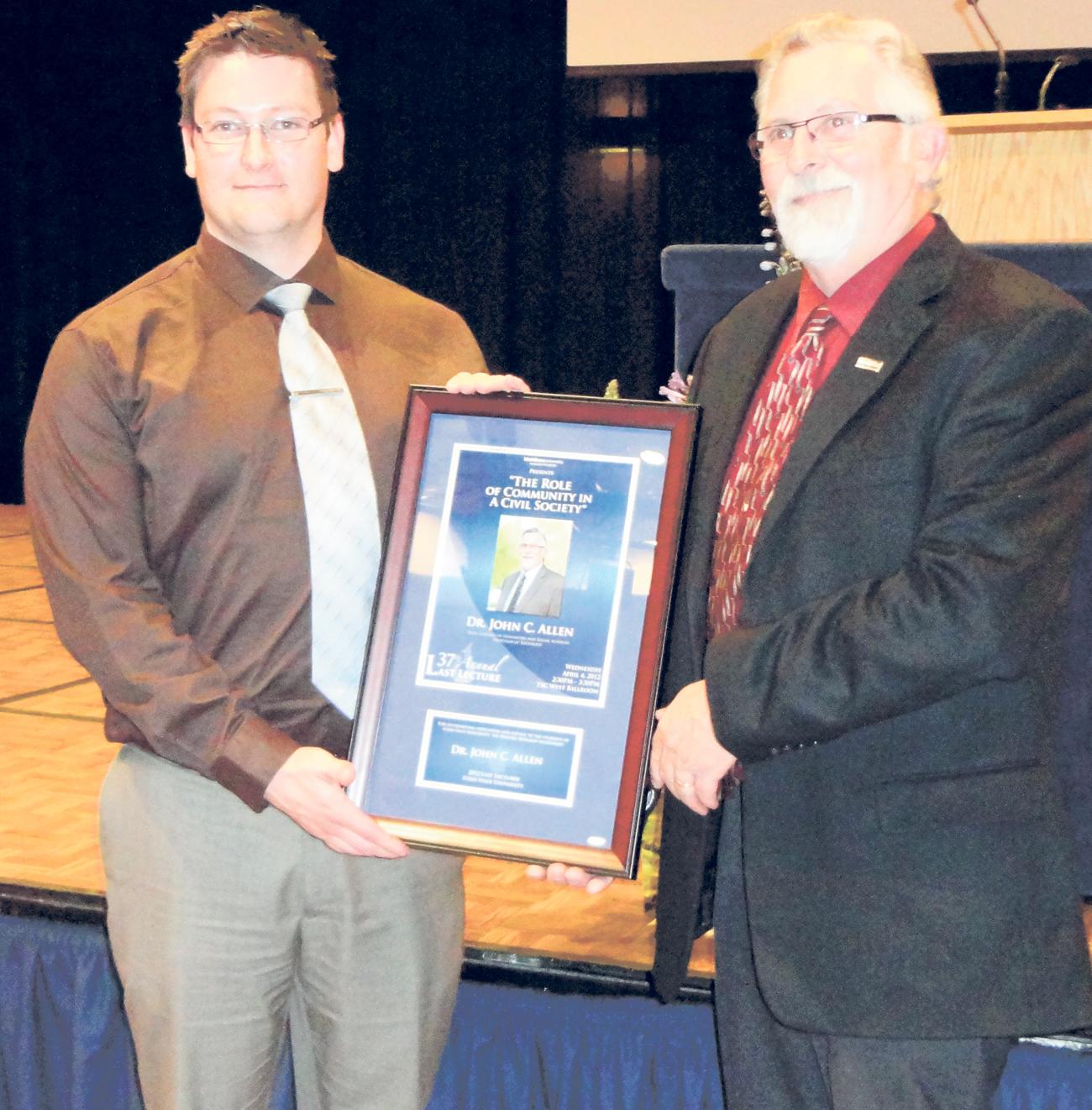CHaSS dean speaks on role of community
A civil society can only be attained when the members of that society make decisions that cater to the collective group, rather than the individual, said Dean John Allen in the 37th annual Last Lecture.
“What I’ve learned … is personalize,” Allen said. “Where we are headed, we are fragmenting our social system … the outsiders are the enemy, and the locals are the enemy to the outsiders.”
Allen is dean of USU’s College of Humanities and Social Sciences and was selected by the Honors Council to speak at this year’s Last Lecture – a tradition in which a distinguished member of campus is asked to give a lecture to USU’s population on the premise that it’s the last one they would ever give.
“The Role of Community in a Civil Society” was the title of Allen’s Wednesday presentation.
Christie Fox, director of the Honors Program, said the Honors Council is asked to choose a professor who has had a great impact both on his or her students inside and outside of the classroom.
During his presentation, Allen shared stories that he experienced throughout his career in sociological work, all of which taught him that social conflict is most successfully solved when all sides involved can see the other groups as humans with similar emotions and life experiences.
Allen received his doctorate in sociology from Washington State University and, while applying his degree in the field, said he has witnessed many situations in which two or more groups had to reach an understanding by becoming more aware of the opposing sides’ backgrounds and reasoning.
This understanding trickles down to his students, he said.
“(Allen) is passionate about learning with his students,” said Dallin Hansen, a USU honors student majoring in sociology. “Dean Allen’s students are the most important students on campus and off. He keeps in contact with his students decades past.”
Allen said his journey toward the conclusions he has made about creating a civil society began as a young boy on a multigenerational farm. He watched as four generations of people with drastically different personalities worked together to operate the farm but didn’t understand how this was possible, he said.
With a doctorate under his belt, Allen said he headed north to a small fishing community in Maine where he learned an important lesson about conflict resolution. Fish were no longer easy to catch, and wealthy “outsiders” began to filter into the town, he said. Locals weren’t happy about the surge of people changing the town. Allen’s solution was to have the locals and the outsiders bring photographs of their families to a meeting where both sides would be present.
“As they started looking at one another’s pictures, it wasn’t us against them,” Allen said. “They saw they were both parents and grandparents, and it was different.”
In another instance, Allen said he acted as a mediator for six months in a civil case between Native Americans and whites caught up in a 100-year conflict.
The federal government gave Dutch settlers land on a Native American reservation, he said, and a century later the impact was still affecting both sides. The area’s school teachers were white while the majority of local students were Native American – the cause of the tension.
After many conversations with both parties, little progress was made and Allen said he left.
Surprisingly, a while later, Allen said students from the school found him and thanked him for what he had done for their community with dream catchers. At first, Allen said he was confused but was then told the time he spent mediating between the two parties had more of an impact than he realized.
“When the whites and natives sat down and there was empathy and civility, and they actually valued one another, they got to talk to someone on the other side of all the pain and the hurt,” Allen said. “It’s all about how we coalesce power. I think civil society allows us to begin connecting.”
The more American culture creates opposing groups, such as Democrats vs. Republicans and religious vs. secularists, the further the U.S. will stray from becoming a civil society, he said.
There are many steps each individual can take to help in creating the ideal society, and it begins with having a civil tone and knowing how to de-escalate emotions, he said. Both of these guidelines are imperative for parties to abide by when listening to one another.
In addition, community members should reach out to the “weirdos” and learn how to consider humanity rather than the self, he said. He touched on a few other attributes a civilized member of society should have, including the ability to make connections with anyone and everyone.
“Be the welcome wagon, but bring diverse voices in,” Allen said. “And not everything has a plan. Take one piece at a time.”
Allen wrapped up by encouraging everyone in the audience to enjoy the constant struggle to become a more civilized society.
“Enjoy it,” he said. “Human interaction is exciting, intense and it changes us all.”
“I think Dean Allen gave us so much to think about,” Fox said. “Heading into this election season, it’s very helpful to think about how we can speak with each other.”
– catherine.meidell@aggiemail.usu.edu

